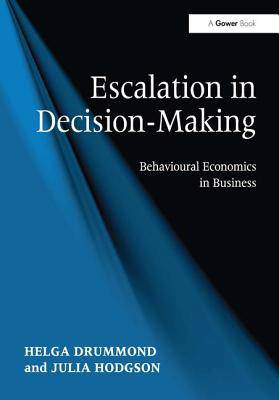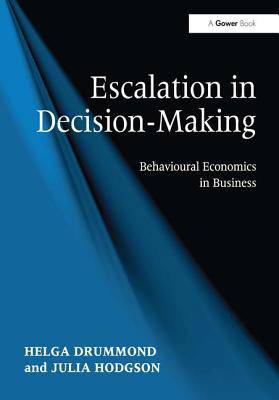
- Afhalen na 1 uur in een winkel met voorraad
- Gratis thuislevering in België vanaf € 30
- Ruim aanbod met 7 miljoen producten
- Afhalen na 1 uur in een winkel met voorraad
- Gratis thuislevering in België vanaf € 30
- Ruim aanbod met 7 miljoen producten
Zoeken
Escalation in Decision-Making
Behavioural Economics in Business
Helga Drummond, Julia Hodgson
Hardcover | Engels
€ 195,95
+ 391 punten
Uitvoering
Omschrijving
When a venture seems to be faltering, do you persist and hope that things will get better or do you cut your losses? This may be one of the most important decisions business or project owners may ever have to make. Persistence involves the risk of throwing good money (or resources) after bad, but owners may feel they have too much invested to quit now. Escalation in Decision-Making reveals why social scientists believe that owners may not respond rationally to such predicaments. Instead of exiting when the odds are clearly stacked against them, they re-invest and end up compounding their losses - a phenomenon known as escalation of commitment. The authors, Helga Drummond and Julia Hodgson, also introduce the concept of entrapment, a variation whereby decision-makers passively drift towards insolvency as the cost of changing direction becomes too high. So: Â- what drives escalation? Â- why do some owners quit whilst others persist until the bailiffs arrive? Â- what can we learn from owners' mistakes? Â- what makes newcomers believe they can succeed where others are conspicuously failing? These questions of behavioural economics are answered using a narrative that analyses decisions made by market traders facing economic extinction. Many highly successful entrepreneurs started their careers in markets - it was once an almost guaranteed route to prosperity - now market traders are struggling to survive. Although the market traders featured are small entrepreneurs, the ubiquitous phenomenon of escalation at the heart of these stories is widely relevant to practitioners such as project managers in large organizations and to those responsible for managing risk in many situations. Rich in case studies involving real business decisions and dilemmas, Escalation in Decision-Making provides an accessible introduction to the application of theory against a background of growing interest in behavioural economics, now being researched and taught in univ
Specificaties
Betrokkenen
- Auteur(s):
- Uitgeverij:
Inhoud
- Aantal bladzijden:
- 180
- Taal:
- Engels
Eigenschappen
- Productcode (EAN):
- 9781409402367
- Verschijningsdatum:
- 28/04/2011
- Uitvoering:
- Hardcover
- Formaat:
- Genaaid
- Afmetingen:
- 175 mm x 246 mm
- Gewicht:
- 489 g

Alleen bij Standaard Boekhandel
+ 391 punten op je klantenkaart van Standaard Boekhandel
Beoordelingen
We publiceren alleen reviews die voldoen aan de voorwaarden voor reviews. Bekijk onze voorwaarden voor reviews.











